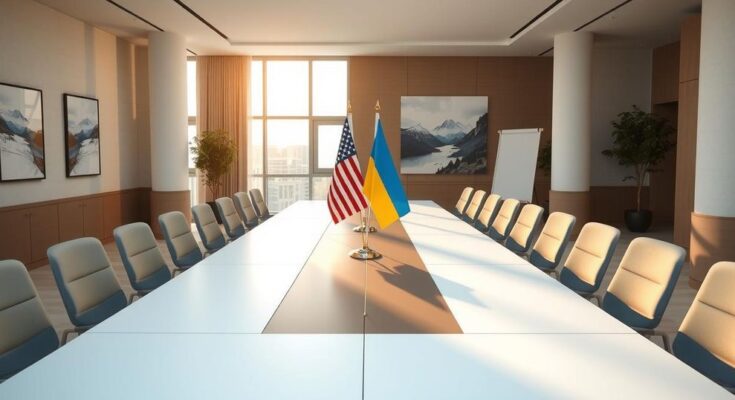The US and Ukraine are engaged in critical talks in Jeddah aimed at concluding Russia’s invasion, coinciding with Ukraine’s largest drone strike to date. Ukrainian officials proposed a truce to signal to Putin the urgency for peace. Concerns remain over military aid and security assurances as European allies prepare for various potential outcomes of the negotiations.
Recent discussions between the US and Ukraine in Jeddah, Saudi Arabia, aim to find a resolution to Russia’s ongoing invasion. These talks coincide with Ukraine launching its largest drone assault to date, deploying 343 drones against Russia, which resulted in casualties and injuries. The incidents reflect the escalating nature of the conflict, prompting Ukrainian officials to propose a truce regarding air and sea engagements to discourage further attacks from Russia.
Andriy Kovalenko, a Ukrainian national security council official, emphasized the significance of the drone attack as a message to President Putin, asserting, “The largest drone attack in history was carried out on Moscow and the Moscow region.” Ukrainian President Volodymyr Zelensky expressed hopes that this meeting would positively influence America’s support for Ukraine in light of a recent dispute with former President Trump.
Andriy Yermak, Chief of Staff for President Zelensky, highlighted the constructive nature of the discussions, stating they were a “work in progress” aimed at establishing peace. The negotiations have extended for over six hours, with pursuit of vital security guarantees for Ukraine being a central theme.
U.S. National Security Adviser Mike Waltz mentioned that the negotiations were progressing favorably. Meanwhile, other critical matters such as military assistance and bilateral agreements with the U.S. remain uncertain following a tense exchange between President Trump and relevant authorities.
The air and sea ceasefire proposal from Ukraine seeks to test Russia’s willingness to pursue peace, emphasizing protection in the Black Sea and care for civilian safety from missile strikes. However, Kremlin officials displayed skepticism towards any potential agreements, reinforcing that they remain prepared for continued conflict.
European allies are closely monitoring the evolving U.S.-Ukraine relationship, prepared to bolster support if required amid potential reductions in American military aid. Concurrently, army chiefs from over 30 nations convened in Paris to discuss forming an international force aimed at deterring any future Russian aggression after achieving a ceasefire, indicative of heightened global military collaboration to support Ukraine.
Significant contributions from European nations were underscored during discussions, with French President Emmanuel Macron advocating for a coordinated approach with NATO. Leaders expressed a unified stance against any demilitarization of Ukraine’s forces while calling for enhanced military readiness against future Russian threats.
In Poland, Prime Minister Donald Tusk announced plans for extensive military training of the adult population in response to ongoing Russian aggression. This initiative aims to prepare up to 100,000 individuals by 2027, highlighting the need for national preparedness amid uncertainties surrounding regional security dynamics.
In conclusion, the talks between the US and Ukraine in Saudi Arabia represent a strategic effort to navigate the complexities of the ongoing conflict with Russia. The discussions focus on achieving peace through a proposed ceasefire and establishing security guarantees for Ukraine, while broader European military cooperation is also being explored. As the situation continues to evolve, the international community remains vigilant, ready to adapt to the outcomes of these high-stakes negotiations.
Original Source: www.independent.co.uk




